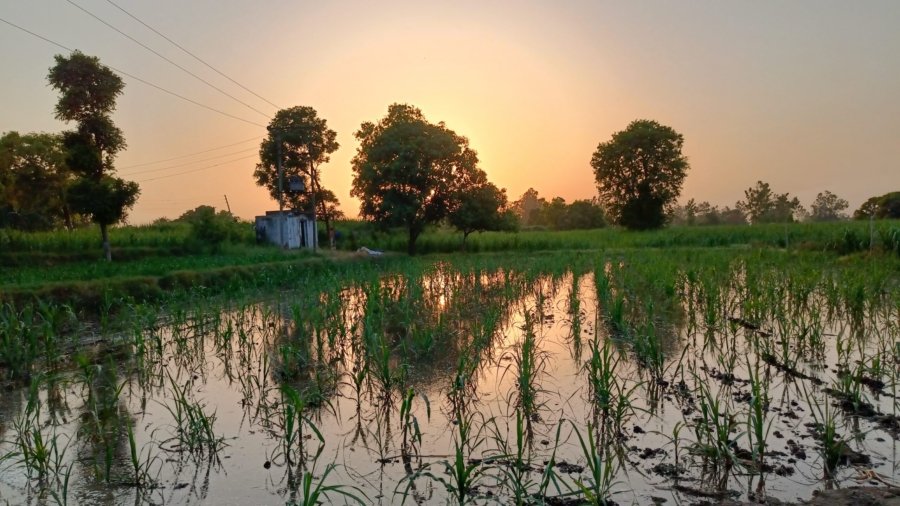Farming, as we all well know, is a challenging profession. Farmers have had to find creative solutions to various ecological challenges for several years. Because of this, they’ve become incredibly adaptable individuals over the years. However, at the same time, the same age-old obstacles continue to remain an issue for many modern farmers.
On top of this, new challenges have arisen in recent years due to changes in the climate and global economy.
More than half of the population of India depends entirely on agriculture for a livelihood, and most of these are small and marginal farmers. Farming has always been the most important economic activity and the backbone of India.
Factors like poor infrastructure, lack of modernization, and declining productivity have hampered Indian farmers from breaking out of the cycle of debt and poverty. Each year, thousands take their own lives due to crop failure and the inability to repay debts.
Over the years, Indian farmers have been responsible for ensuring food security for the country, but most of them are now toiling in the fields with little to no luck. Several nonprofits work closely with agricultural communities, encouraging sustainable farming methods and improving their lives.
Here are 10 NGOs that are helping farmers grow better crops and create a sustainable livelihood:
- Aahwahan
A Bengaluru-based NGO, Aahwahan, plans on developing infrastructure that can be used by farmers to grow and cultivate crops most effectively and efficiently. It promotes an independent mindset in farmers regarding seed procurement, better irrigation, and overall crop lifecycle development.
Aahwahan collaborates with universities to bring about affordable and innovative agricultural solutions. The organization aims to eliminate the middlemen who exploit farmers by providing minimal prices for their crops, thus changing a significant portion of the agricultural sector and offering hope for a better livelihood.
- End Poverty
Started in 2009, End Poverty focuses on poverty reduction through sustainable livelihood creation, girls’ education, rural development, and civil society development. It operates in Rajasthan, Haryana, Karnataka, Madhya Pradesh, and Delhi, benefiting small and marginal farmers, traditional artisans, poor women, uneducated girls, and unemployed youth.
End Poverty empowers farmers by strengthening grassroots processes, increasing farm productivity, facilitating credit linkage, and connecting them to markets.
- Swades Foundation
Swades Foundation aims to empower one million rural Indians every 5-6 years through holistic development in health, education, water and sanitation, and economic development. Their On-Farm Programme brings more land under assured irrigation, enabling farmers to sow economically viable crops and increase productivity. - Universal Versatile Society (UVS)
Based in Mumbai, UVS focuses on preventing farmer suicides through basic education, awareness raising, skill impartation, infrastructure development, and small enterprise development. Their EcoVillage projects address various thematic areas including environment, education, agriculture, and mental health in Washim district, Maharashtra. - Gramya Resource Center for Women
Founded in 1993, Gramya promotes women’s rights and the well-being of farming communities, addressing the crisis of farmer suicides and supporting victims’ families. Their sustainable agriculture models emphasize gender equality, and they also advocate for child rights and education. - Dilasa
Established in 1994, Dilasa operates in Maharashtra’s Vidarbha and Marathwada regions, advocating innovative and sustainable irrigation methods for tribal people and small farmers. They also run a farmers’ support center to inform about government schemes and have created numerous self-help groups for women to encourage organic farming. - Marathwada Navnirman Lokayat (MANAVLOK)
Founded in 1982, MANAVLOK is dedicated to the socio-economic upliftment of the rural poor in Maharashtra. Their activities include dam desilting, watershed development, legal aid, and community-based monitoring programmes. They have significantly improved farm productivity and benefited thousands of villagers. - Watershed Organization Trust (WOTR)
WOTR focuses on comprehensive rural development initiatives such as agriculture, climate change adaptation, natural resource management, and social development. Their climate-resilient agriculture approach helps farmers mitigate risks, reduce cultivation costs, and increase productivity. - Vrutti
Active for over 23 years, Vrutti has improved the lives of over one million individuals by empowering small producers. Their Agriculture Enterprise Facilitation Centre (AEFC) model engages deeply with farming communities to enhance their productivity and income, covering nine districts across six states. - Professional Assistance for Development Action (PRADAN)
Founded in 1983, PRADAN works to alleviate rural poverty by promoting sustainable livelihoods. Their agricultural interventions have helped smallholder farmers achieve year-round food security and earn steady incomes. They promote eco-friendly technologies and assist farmers in adapting to climate variability.

Kisan Connection: Bridging the Gap for Indian Farmers
In addition to the tireless efforts of these NGOs, initiatives like Kisan Connection are crucial in empowering smallholder farmers in India. Kisan Connection addresses the lack of organized market facilities for processed farm products and unconventional crops, aiming to improve market opportunities and economic conditions for farmers.
Kisan Connection is part of a broader movement advocating for good food and good farming. By connecting farmers directly with customers through platforms like ConnectFarmer.com, they enhance market access and ensure fair prices for farmers. This initiative has already successfully linked 300 farmers with end customers, demonstrating the potential for scalable impact.
Conclusion
The work of NGOs and initiatives like Kisan Connection is vital for sustaining agriculture and supporting the livelihoods of Indian farmers. By promoting sustainable farming practices, improving market access, and empowering rural communities, these organizations are helping to create a brighter future for agriculture in India.
Our mission is to inform, inspire, and empower. We endeavor to reach out to KISAN in increasingly innovative ways. Join us this autumn to contribute to a powerful movement, supporting good food and good farming for all, now and in the future.

